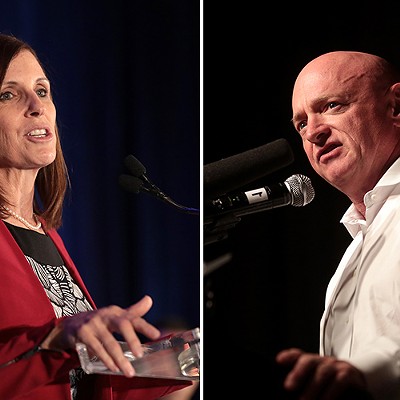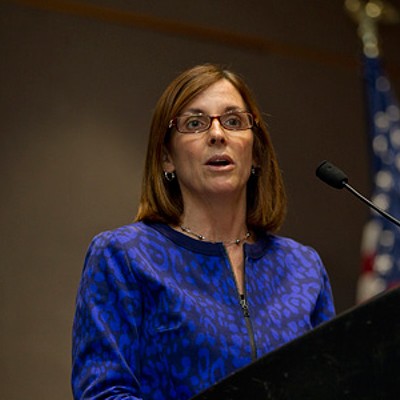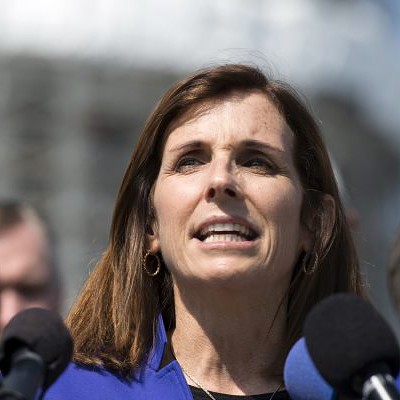With the 2014 election nearly a year away, McSally has plenty of opportunity to change the narrative about her reluctance to stake out positions on legislation.
McSally is well positioned in the race. She has a terrific political bio as a former combat pilot who became the first woman in the U.S. Air Force to command a squadron of A-10s based at Davis-Monthan Air Force Base. With almost no campaign experience or local name ID, she burst onto the political scene in 2012 and ended up losing to Barber by a roughly 2,500 votes. And in the third fundraising quarter of 2013, she raised an impressive $358,000 for her campaign—more than Barber's $318,000, although he still had nearly twice as much in the bank as she did as of Sept. 30.
Barber is defending a district that leans just slightly Republican—34 percent GOP and 33 percent Democratic, with the remainder the independent voters who are key to winning the district.
Democrats have held the area since Gabrielle Giffords won the seat in 2006, largely because Republican primary voters have typically nominated hard-right conservative men. But the races have been close and in 2014, many casual voters who trend Democratic are less likely to turn out at the ballot box.
So it's little wonder that Barber was to the "10 Most Vulnerable House Members" list compiled by Roll Call, a D.C.-based political journal which noted: "Democrats privately worry about Barber's ability to win without presidential-year turnout—or lots of national dollars—behind him. But Barber inherited former Rep. Gabrielle Giffords' political team, a group that repeatedly proves they can get the vote out in Tucson."
While she's the most high-profile Republican in CD2, McSally faces a primary next August before she can take on Barber. That contest got a little more crowded this month with the entry of Republican Shelley Kais, owner and operator of Kais Business Systems, a business and government consulting firm.
Flanked by family and friends, Kais made a public jump into the race last week at the weekly meeting of the Pima County Republican Club.
"The Republicans have lost CD2 since 2006," Kais said. "It is time to take the seat back and send conservative values to Washington, D.C."
Kais' speech was critical of the status quo on federal spending, border security, health care reform and other issues, but short of specific policy prescriptions. In an interview after the luncheon, she said she had not yet decided where she stood on thorny issues such as the path to citizenship in the Senate's immigration-reform package or the Employment Non-Discrimination Act, although she did say she would have voted in favor of the compromise deal that reopened the federal government last month.
While Kais was making her debut in front of the lunch crowd, the other Republican in the race, Ed Martin, sent out a press release questioning her motives for getting into the race.
Martin's press release noted that Kais had volunteered on McSally's campaign in 2012 and could now be involved in "an attempt to split the grassroots conservatives to benefit Martha McSally."
Martin, who worked in Republican politics in New York state and has hosted a local radio talk show, said that "Kais is a former campaign worker, ardent supporter and reported friend of Martha McSally. I think she needs to fully articulate why she no longer supports McSally."
Kais, who explained that she assisted McSally during her run in the 2012 special election to complete the term of Giffords after she resigned from Congress, denied that she was in the race to boost McSally.
"If there was anybody who did that, we should never elect them ... and we should ban them from our party," Kais said. "I'm standing here and telling you today that I feel that if you could prove that is what I am doing, that I should be banned from the Republican Party."
Kais said she didn't consider herself a superior candidate to Martin or McSally, but "sometimes, different skills work at different times."
Martin said he would "take Shelley at her word. I like Shelley. But there are a lot of people who look at the fact that in the not-so-distant past she was a supporter of Martha. People have raised the question to me, I'm sure they've raised it to her, and it's up to her as to whether she wants explain it or not."

















